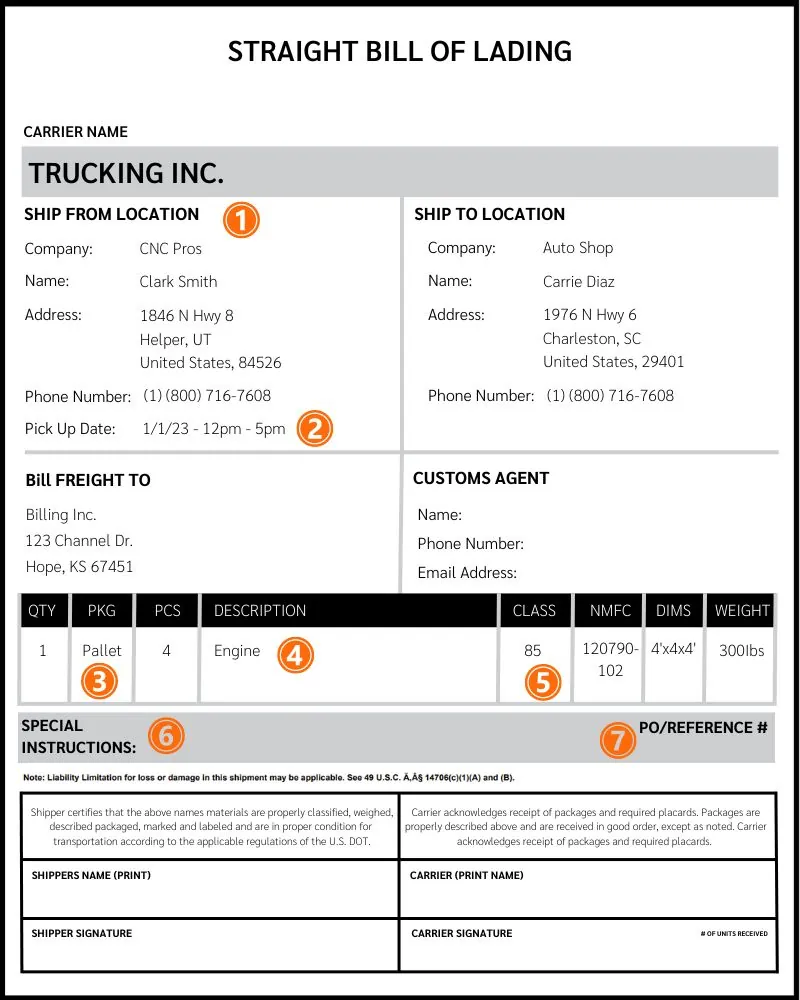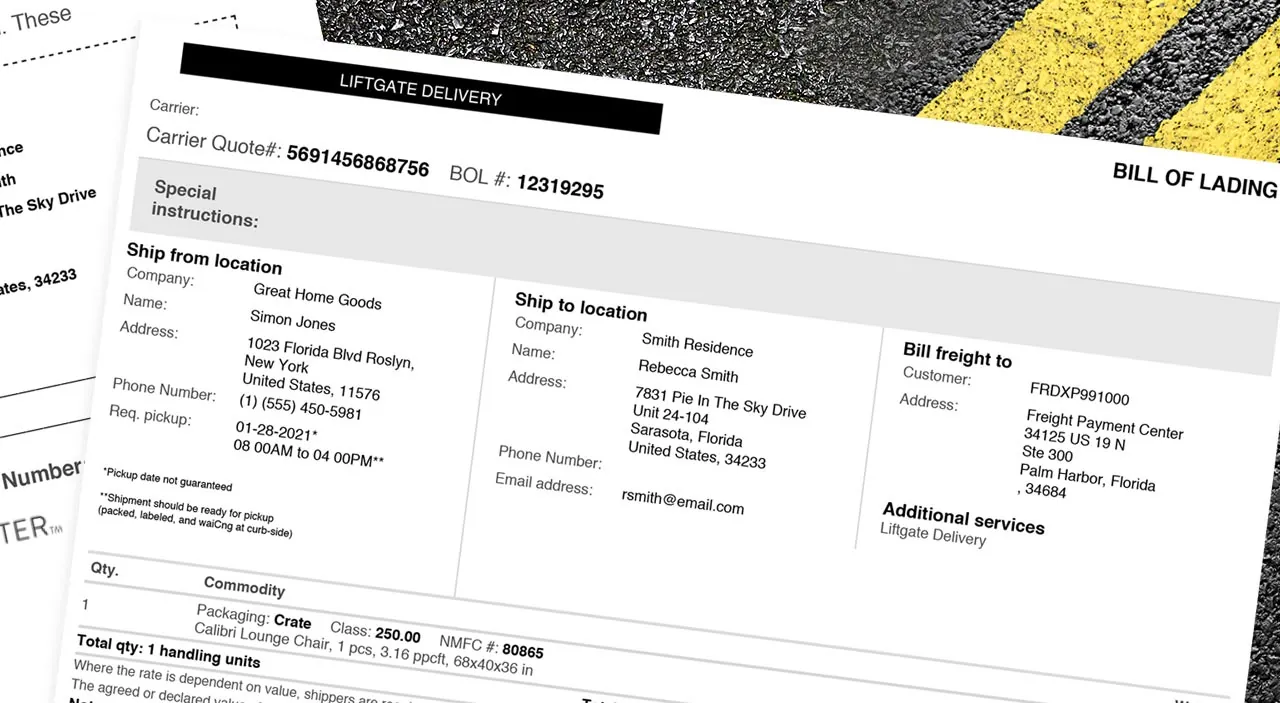
What is the Bill of Lading?
A bill of lading is a crucial document in international trade and shipping. It serves as a contract, receipt, and title of goods all rolled into one.
What Is The Bill of Lading?
The Bill of Lading (BOL) is a crucial document for moving a freight shipment. This legally binding document provides the driver and carrier with all the necessary details to process and invoice the shipment correctly. The BOL serves three main purposes: it is a receipt for freight services, a contract between the carrier (the party transporting the goods) and the shipper (the party sending the goods), and a document of title.

Freight Bill of Lading (BOL) Example
- Names and addresses: The full names and addresses of both the consignee and shipper should be legible. Next, they should be easy to locate on the document.
- Date: The pickup day and pick-up window. Standard is Noon to 5 PM local time.
- Packaging type: Container used for shipment (shipping pallet, crate, skid, etc.).
- Description of items: Shippers should note the number of shipping units, dimensions, and weight of their freight. Material description is also listed on the BOL.
- NMFC freight class: Freight classes impact the cost of the shipment. Freight shipments divide into categories based on weight, dimensions, density, storage capability, ease of handling, value, and liability.
- Special instructions: Note instructions for the carrier (this doesn’t include additional service requests like liftgate or delivery notification).
- Purchase orders or unique reference numbers: The unique numbers may be necessary to a business depending on the circumstances. It is also used as a reference for freight to be accepted or released for pickup.
- Department of Transportation Hazardous material designation: Cite any shipment hazards. Specific requirements and rules apply when shipping.
Need help to determine your shipment details or finding your Bill of Lading paperwork? Contact our agents now.
Importance of a BOL
The bill of lading plays a crucial role in the logistics chain, providing legal protection, facilitating the transfer of goods, ensuring accountability, and serving as a vital document for various stakeholders involved in international trade and shipping.

Why Choose FreightCenter?
- LTL Freight from 50+ carriers
- Instant Tracking and Freight rates anytime
- LTL Freight solutions to anywhere in the U.S. & Canada
- Unbeatable discounts on your freight LTL, truckload, rail, air, and more
- Automated LTL paperwork & invoices
- Manage all freight quotes & shipments in one place
- 30+ years of transportation experience working for you!
- Download a pre-filled-out bill of lading
- FreightCenter’s Rewards Program
What is the Purpose of a BOL?
- Provides information on the terms of the shipment.
- Explains the quantity, destination, and type of shipment the carrier is delivering
- Serves as a receipt for the shipper
- Also used as the title to the goods
- Represents ownership of the goods
Who gets the BOL?
The shipper, broker, freight forwarder, or consignee, receives the BOL. (The consignee is the person who purchased the goods to begin with).
Does Every Shipment Need a BOL?
In most cases, every freight shipment requires a bill of lading, it serves as a crucial document that outlines the terms and conditions of the transportation agreement between the shipper and the carrier. It also acts as a receipt for the goods being shipped.
However, there are some exceptions to the requirement of a bill of lading. It’s important to consult with the relevant shipping regulations and the specific requirements of the carrier and destination country to determine if a bill of lading is necessary for a particular freight shipment.

Who gives the Bill of Lading to the shipper?
The bill of lading is typically issued by the carrier or their authorized agent to the shipper. The carrier can be a shipping line, airline, trucking company, or any other entity responsible for transporting the goods.
The issuance of the bill of lading signifies that the carrier has received the goods from the shipper and has agreed to transport them to the specified destination.
It’s important to note that in some cases, such as when goods are shipped through a freight forwarder or logistics provider, the bill of lading may be issued by the freight forwarder or logistics provider on behalf of the carrier.

Frequently Asked Questions: Bill of Lading (BOL)
Q. What is the purpose of the bill of lading?
A. The purpose of a bill of lading (BL or BOL) is to serve as a legal document issued by a transportation company to a shipper. It outlines the type, quantity, and destination of the goods being transported while also acting as a receipt upon delivery. This document ensures transparency and accountability in the shipping process.
Q. What are the 4 functions of the bill of lading?
A. The bill of lading has four main functions: it serves as a receipt of goods, a contract between the shipper and carrier, a document of title, and a record of important information such as destination, shipper, and consignee. This document plays a crucial role in ensuring smooth and secure transportation of goods.
Q. Who is required to have a bill of lading?
A. Any individual or company involved in freight shipments must have a bill of lading (BOL). This legal document is required for all types of shipments, regardless of size or mode of transportation. To be considered valid, the BOL should include specific information and be signed by both the shipper and carrier. BOLs can be created electronically or manually.
Q. What is difference between bill of lading and bill of shipping?
A. The main difference between a bill of lading and a shipping bill is that a bill of lading acknowledges the receipt of goods and their delivery to a specified party, while a shipping bill declares the value, quantity, and type of goods being shipped.
Thousands of businesses trust FreightCenter to move their freight faster, smarter, and cheaper! From unbeatable rates to top-notch service, our customers are raving about their shipping success.
See why they keep coming back!


